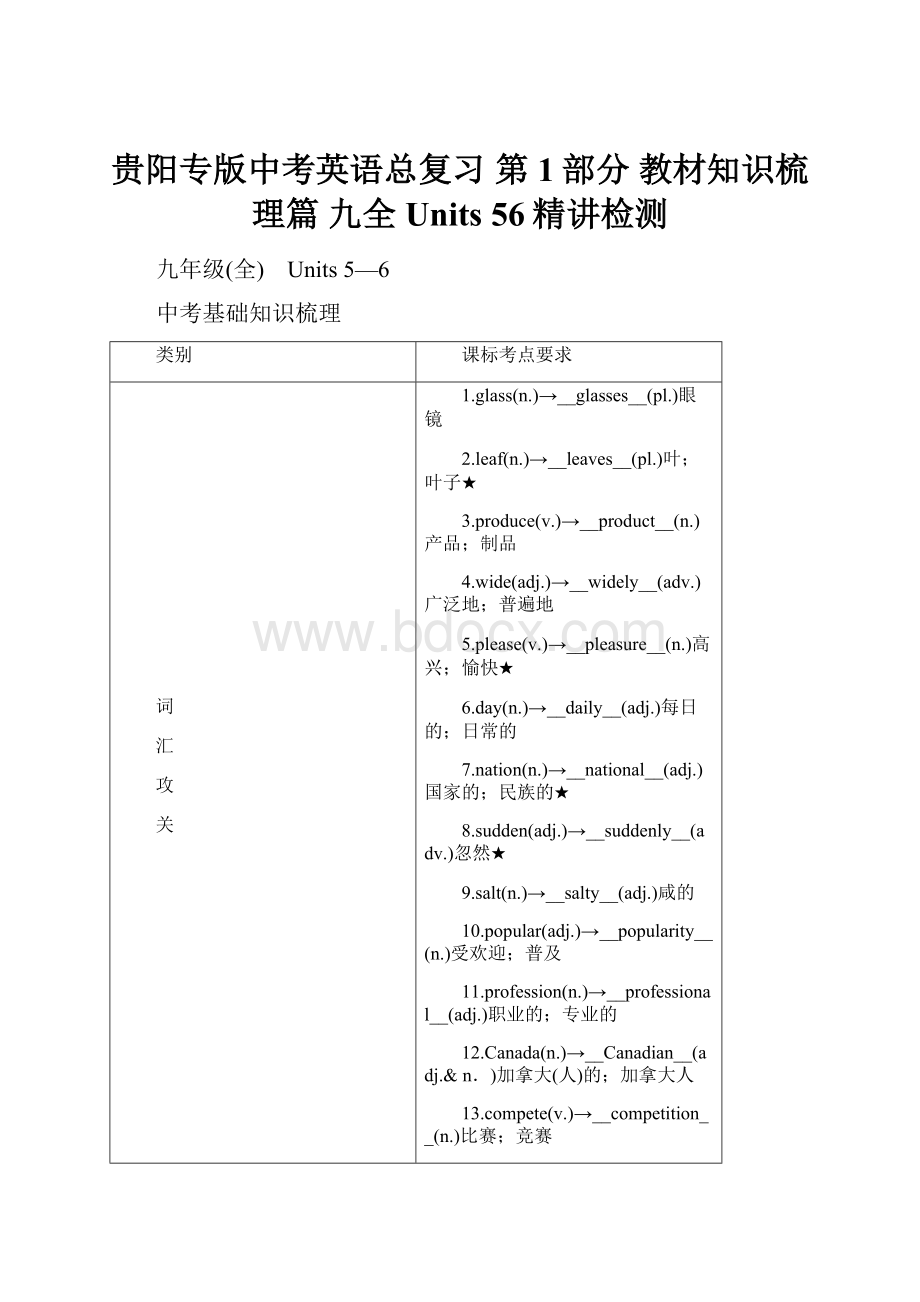贵阳专版中考英语总复习 第1部分 教材知识梳理篇 九全 Units 56精讲检测.docx
《贵阳专版中考英语总复习 第1部分 教材知识梳理篇 九全 Units 56精讲检测.docx》由会员分享,可在线阅读,更多相关《贵阳专版中考英语总复习 第1部分 教材知识梳理篇 九全 Units 56精讲检测.docx(12页珍藏版)》请在冰豆网上搜索。

贵阳专版中考英语总复习第1部分教材知识梳理篇九全Units56精讲检测
九年级(全) Units5—6
中考基础知识梳理
类别
课标考点要求
词
汇
攻
关
1.glass(n.)→__glasses__(pl.)眼镜
2.leaf(n.)→__leaves__(pl.)叶;叶子★
3.produce(v.)→__product__(n.)产品;制品
4.wide(adj.)→__widely__(adv.)广泛地;普遍地
5.please(v.)→__pleasure__(n.)高兴;愉快★
6.day(n.)→__daily__(adj.)每日的;日常的
7.nation(n.)→__national__(adj.)国家的;民族的★
8.sudden(adj.)→__suddenly__(adv.)忽然★
9.salt(n.)→__salty__(adj.)咸的
10.popular(adj.)→__popularity__(n.)受欢迎;普及
11.profession(n.)→__professional__(adj.)职业的;专业的
12.Canada(n.)→__Canadian__(adj.&n.)加拿大(人)的;加拿大人
pete(v.)→__competition__(n.)比赛;竞赛
→__competitor__(n.)参赛者;竞争者
14.translate(v.)→__translation__(n.)翻译
→__translator__(n.)翻译者
短
语
归
纳
1.以……闻名;为人知晓__be__known/famous__for__
2.不论;无论__no__matter__
3.由……制成__be__made__of/from__
4.手工__by__hand__
5.就我所知__as__far__as__I__know__
6.全世界__all__over__the__world__
7.对……有好处__be__good__for__
8.实际上__in__fact__
9.在将来__in__the__future__
10.偶然;意外地__by__accident__
11.发生;出现__take__place__
12.毫无疑问;的确__without__doubt__
13.突然;猛地__all__of__a__sudden__
14.错误地;无意中__by__mistake__
15.把……分开__divide…into__
16.钦佩;仰慕__look__up__to__
17.掉进__fall__into__
18.在电话上__on__the__phone/telephone__
19.最后__in__the__end__
20.想出;提出__come__up__with__
21.梦想__dream__of__
22.不仅……而且……__not__only…but__also…__
句
型
再
现
(
含
情
景
交
际
)
1.(询问物品材质)“这个飞机模型是什么做的?
”“它是旧木头和玻璃做成的。
”
—__What's__themodelplane__made__of__?
—It's__made__of__usedwoodandglass.
2.(谈论发明时间)“拉链是什么时候发明的?
”“它发明于1893年。
”
—__When__was__thezipper__invented__?
—It__was__invented__in1893.
3.看起来全世界很多人喝中国茶。
__It__seems__that__manypeople__all__over__the__world__drinkChinesetea.
4.他发现当地商店中如此多的产品是在中国制造的,这很有趣。
Hefound__it__interesting__thatsomanyproductsinthelocalshops__were__made__in__China.
5.然而,他希望将来中国也更加擅长制造人们在世界各地都能够买到的高科技产品。
However,hehopesthat__in__the__future__Chinawillalso__get__better__at__making__hightechnologyproductsthatpeoplecanbuyin__all__parts__of__the__world__.
6.当处于困境中时,他把它们放出去寻求帮助。
He__sent__them__out__to__ask__for__helpwhen__in__trouble__.
7.在春节期间,它们被贴在窗户、门和墙上,作为好运和幸福年的象征。
DuringtheSpringFestival,they__are__put__on__windows,doorsandwalls__as__symbols__of__wishes__for__goodluckandahappynewyear.
8.需要花费好几周的时间来完成一切事情。
__It__takes__severalweeks__to__complete__everything.
9.据说有一位叫作神农的中国统治者最早发现了茶可以饮用。
__It__is__said__that__aChineseruler__called__ShenNongwasthefirst__to__discover__teaasadrink.
10.在英国,茶直到大约1660年才出现,但是不到100年,它变成了国家级的饮料。
InEngland,tea__didn't__appear__until__around1660,butin__less__than__100years,ithadbecomethenationaldrink.
11.这些明星鼓励年轻人努力工作来实现他们的梦想。
Thesestars__encourage__youngpeople__to__work__hardto__achieve__their__dreams__.
语法
1.一般现在时的被动结构:
am/is/are+过去分词(详见第二编P131)
2.一般过去时的被动结构:
was/were+过去分词(详见第二编P131)
话题
Unit5ThingsmadeinChina(中国制造的东西)
Unit6Inventions(发明)
贵阳中考重难点突破
beknownfor的用法(教材九年级P34)
【满分点拨】
beknownfor意为“以……闻名;为人知晓”,相当于befamousfor。
如:
HangzhouisknownfortheWestLake.=HangzhouisfamousfortheWestLake.杭州因西湖而闻名。
【归纳拓展】
(1)beknownas=befamousas,意为“作为……而闻名”。
如:
MoYanisknownasawriter.=MoYanisfamousasawriter.莫言作为作家而出名。
(2)beknownto意为“为……所熟知”。
如:
TheGreatWallisknowntopeopleallovertheworld.全世界的人都知道长城。
(A)1.(贵阳背景特色题)—IhearthatHongfengLake(红枫湖)issuchabeautifulplace.
—Yes,it'sknown______itsbeautyofnature.
A.forB.asC.to
(初高衔接题)下列句子有一处错误,请找出并改正。
2.CristianoRonaldo(C罗)isknownforafootballplayer.__as__
3.Confucius(孔子)isknownasChinesepeople.__to__
avoid的用法(教材九年级P35)
【满分点拨】
(1)avoid可表示“避开”或“躲避”(keeponeselffrom)某人或某物;也可表示“防止”(prevent)某事的发生。
如:
Ithinksheisavoidingme.我想她是在躲着我。
(2)avoid+名词/代词/动名词作宾语,但是不能接不定式作宾语。
如:
Heavoidedansweringmyquestions.他避而不答我的问题。
1.Theyallavoided__mentioning__(mention)thatname.
2.(贵阳人文信息题)Guiyanghastakenalotofmeasures__to__avoid__(avoid)thedestructionoflocaltourismresources.
(B)3.(2018襄阳中考改编)Thetrafficisterriblybusyinthemorning.You'dbetteravoid______inthecenterofthecity.
A.driveB.drivingC.todrive
辨析pleasure,pleased,please与pleasant(教材九年级P42)
【满分点拨】
单词
词性
含义及用法
pleasure
名词
意为“愉悦;快乐”,多用于口语中,如:
It'smypleasure.不客气。
/Withpleasure.我很乐意。
pleased
形容词
意为“高兴的;满意的”,通常作表语,句子的主语是人,常用短语:
bepleasedwithsb./sth.或bepleasedtotosth.
please
动词
及物动词
表示“使高兴;使满意”等
不及物动词
表示“想,选择,喜欢”等
pleasant
形容词
作定语
令人高兴的;令人愉快的
常用来修饰物
作表语
使人感到高兴的、愉快的
句子的主语是表示事物的词语或形式主语it,它侧重客观地、总体地描述事物
Itisapleasuretomeetyou.很高兴认识你。
Weareverypleasedwithournewhouse.我们对我们的新房很满意。
Thegoodnewspleasedthefamily.这个好消息使全家人很高兴。
Ihopeyouhaveapleasanttrip.我希望你旅途愉快。
pleasure,please,pleased,pleasant
1.Iamvery__pleased__withthedocumentaryAmazingChina(《厉害了,我的国》).
2.Ihopetohavea__pleasant__tripaftertheseniorhighschoolentranceexam.
3.Shecriedoutwith__pleasure__whenshesawherfavoritestar,WangJunkai.
4.Themotherdideverythingshecouldto__please__herson.
notonly…butalso…的用法(教材九年级P46)
【满分点拨】
notonly…butalso…意为“不但……而且……”。
(1)可连接主语,连接并列主语时,谓语动词采取就近原则,即由butalso后的主语来决定谓语动词的形式。
如:
NotonlyIbutalsoTomandMaryarefondofwatchingTV.不仅我,而且汤姆和玛丽都喜欢看电视。
(2)可连接谓语动词。
如:
TheAmericansandtheBritishnotonlyspeakthesamelanguagebutalsosharealargenumberofsocialcustoms.美国人和英国人不但语言相同,而且有很多相同的风俗习惯。
(3)可连接宾语、宾语补足语、表语、状语。
如:
Lightandbrightcolorsmakepeoplenotonlyhappierbutalsomoreactive.浅色和鲜艳的颜色不但使人看了更加高兴,也会使人更加活泼。
(4)notonly…butalso…前后连接两个句子时,notonly后的句子要用部分倒装,但butalso后的分句不用倒装。
如:
Notonlydidhecome,butalsohesawher.他不仅来了,而且还见到了她。
【归纳拓展】
就近原则的连词词组
either…or…或者……或者……
neither…nor…既不……也不……
(B)1.(恩施中考)______hispartner______hehasbeentoParis,sotheyknowPariswell.
A.Neither;nor B.Notonly;butalso
C.Either;or
(C)2.(2018黔南中考改编)______myfriends______Ilikeplayingcomputergamesbecausewethinkitwastestime.
A.Both;andB.Either;orC.Neither;nor
(A)3.(原创题)Thereisonlyoneticket,so______you______yoursistercangototheconcert.
A.either;orB.both;andC.neither;nor
(B)4.—IsawTom'sfatherbuyingsomebooksjustnow.
—That'snotstrange.NotonlyTombutalsohisfather______reading.
A.enjoyB.enjoysC.enjoyed
—Whataretheyusedfor?
它们是用来做什么的?
—Theyareusedfor…它们是用来……(教材九年级P42)
【满分点拨】
beusedfordoingsth.意为“被用来做某事”,相当于beusedtodosth.。
【归纳拓展】
“beused+介词”的用法
(1)“beused”后跟不同的介词,含义有所不同:
beusedfordoing…意为“被用来做……”;beusedas意为“被用作……”;beusedby意为“被……使用”。
(2)beusedtodoing…意为“习惯于做……”;usedtodo意为“过去常做……”。
这个实验室是用来做医学研究的。
Thelaboratory__is____used____for__doingmedicalresearch.
ItissaidthataChineserulercalledShenNongwasthefirsttodiscoverteaasadrink.据说有一位叫作神农的中国统治者最早发现了茶可以饮用。
(教材九年级P43)
【满分点拨】
Itissaidthat…相当于Peoplesaythat…意为“人们说……”,属于“It+be+过去分词+that从句”结构,其中it是形式主语,真正的主语是that引导的从句。
【归纳拓展】
“It+be+过去分词+that从句”结构的常见句型:
(1)Itisbelievedthat…人们认为……
(2)Itissupposedthat…据猜测……
(3)Itisreportedthat…据报道……
(4)It'sknownthat…众所周知……
1.(新信息题)It__was__reported__(report)thatTyphoonMangkhut(台风“山竹”)landedinGuangdongandcausedmanyproblems.
(B)2.(新信息题)It______thatthemovieJurassicWorld:
FallenKingdom(《侏罗纪世界:
失落王国》)isveryexcitingandmanypeoplegotothecinematowatchit.
A.saysB.issaidC.saying
随堂知识巩固
单项选择。
(B)1.(2019预测)Blacktea______inChinamorethan600yearsago.
A.isinvented B.wasinvented
C.invents
(C)2.(2018哈尔滨中考)—Alice,whichseasondoyoulikebest?
—Autumn.Thefallen______arelikeathickblanketontheground.Whatbeautifulsceneryitis!
A.leafB.leafsC.leaves
(B)3.(2018十堰中考改编)Yoursweaterlooksnice.Isitmadeofwool?
—Yes,andit'smade______Shanghai.
A.byB.inC.for
(A)4.(2018哈尔滨中考)Sofar,ConfuciusInstitute(孔子学院)hasbeensetupinmanyothercountries.AndChineseis______spokeninthosecountries.
A.widelyB.badlyC.hardly
(A)5.(2017百色中考改编)Thesemachines______cutgrass.【考点❺】
A.areusedto B.useto
C.areusedfor
(B)6.(人文信息题)Asweallknow,thePeople'sLiberationArmy______in1927.
A.founded B.wasfounded
C.isfounded
(C)7.(2018襄阳中考改编)—Excuseme,sir.Areyousuretheumbrellainyourhandbelongstoyou?
—Oh,sorry.Itookit______.Mineisoverthereunderthechair.
A.atonce B.ontime
C.bymistake
(B)8.It's______thatXiong'anNewAreawillbefinished______theendof2020.【考点❻】
A.reported;in B.said;by
C.known;in
(B)9.(2018邯郸期末改编)—Youlooksoniceinyournewuniform.You'dbetteravoid______itdirty.
—OK,mom.Ifitisdirty,Iwillwashit______.【考点❷】
A.make;myself
B.making;myself
C.making;me
(B)10.(原创题)Outdooractivitiescan______makekidsstronger,______helpkidsgetmoreknowledge.【考点❹】
A.either;or
B.notonly;butalso
C.neither;nor
(B)11.—Arethevisitorsallfrom______?
—No,thereareonly5______inthegroup.
A.Germany;Germany
B.Germany;Germans
C.German;Germans
(A)12.—OurEnglishteacheralwayskeepshislessons______.
—That'swhyheissopopularamonghisstudents.
A.livelyB.happilyC.freely